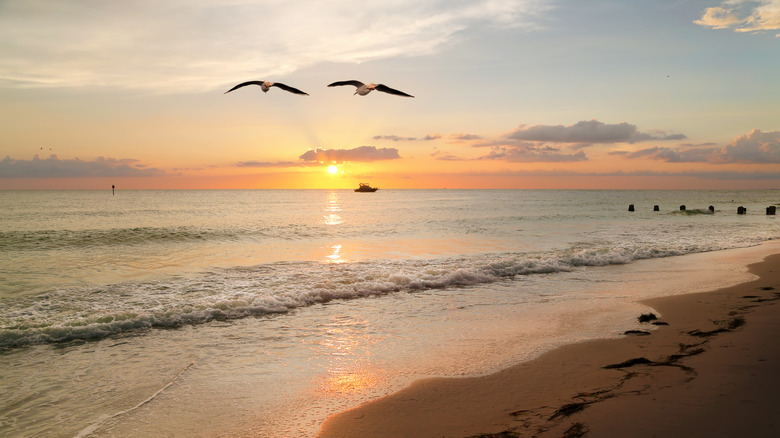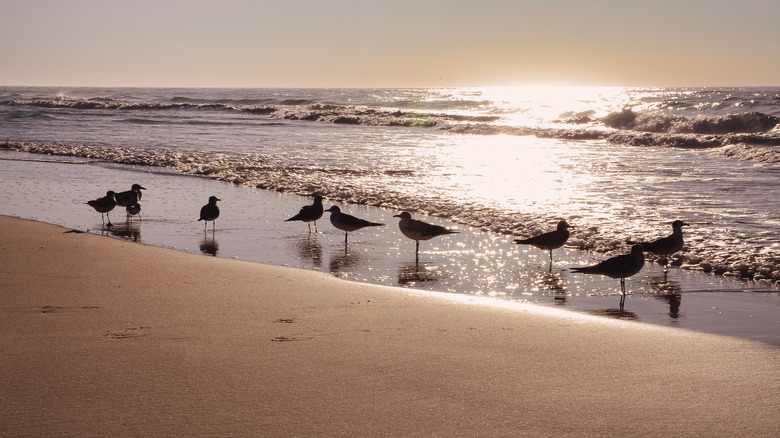Don't Make This Unforgivable Beach Mistake When You Go To Florida For The First Time
Despite their bad reputation, seagulls are incredible and resilient birds deserving of our respect — but not our french fries. Commonly seen gulls like the herring, ring-billed, and California gulls have adapted to live among humans all over the United States, so if you're enjoying a relaxing Florida beach vacation and eating a snack while sunbathing, you're probably going to find yourself making eye contact with one of these hungry birds. Unfortunately, you shouldn't share.
Humans are everywhere, and by begging for food from beachgoers and digging through our trash to find tasty morsels, these birds have found a way to exploit the situation, but they may have done it too well for their own good. As fun as it is to make these seabirds happy by tossing them some leftover bread, doing so will provoke some dirty looks from everyone else trying to enjoy the beach as it becomes a writhing mass of flapping wings and clacking beaks. Most importantly, you might also be making the birds sick and putting yourself and others in danger.
Feeding seagulls is dangerous for you and your fellow beachgoers
Florida beaches can have cool sand, hot sun, and gorgeous waves, but they also have seagulls. Gulls can be very cute, and if one is hanging around your beach towel asking you with its eyes to turn over your tortilla chips, it may be hard to resist. Unfortunately, once you toss over a snack, it's only a matter of time until a flock of a dozen or so more notice that you have something they like and come to pester you. When this happens too much, gulls start thinking of people as food sources, not threats. Gulls that have come to view humans on Florida beaches as food sources may also swarm people with food, and their bites can be extremely painful.
As shown in one 2017 video, even showing a seagull that you have food can lead to a sudden attack from an entire flock on popular Florida beaches. We can't blame the gulls; this is the behavior we accidentally taught ourselves. While there are many solutions that people have tried on beaches with a gull problem, from motion-activated water guns to bringing in birds of prey as avian assassins to take out the gulls, the easiest fix is just not to train them to be like this in the first place.
Feeding seagulls can be dangerous for them
You might be able to escape the crowds by opting for one of Florida's hidden gem islands over its most popular beaches, but you probably can't escape the gulls. Sadly, they can't escape us either. Ornithologist Andrew Farnsworth told National Geographic, "Unlike for most wild animals, we've actually expanded their habitat and food sources with our behavior. Gulls are excellent opportunists and will keep coming back if they find something good."
Farnsworth's statement is backed up by research. One study from the Massachusetts Department of Conservation and Recreation found that if given the option, gulls will consistently choose to eat snacks given to them over their natural food sources. While it's amazing to see how these birds have adapted to thrive in a human-dominated world, changing their vital survival instincts can be very bad. Over time, generations of water birds may teach their babies to go to people for food rather than how to look for their own — and the food is not healthy for them.
Most of the fun snacks people enjoy eating on Florida beaches, like crackers and chips, can cause birds to feel full without providing the actual nutrients their natural diet does. Not only can they become malnourished, it can cause medical issues like angel wing, which makes their wings stick out at odd angles and makes it harder to fly. So, for their sake and yours, don't toss gulls your leftovers.

